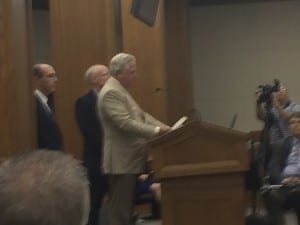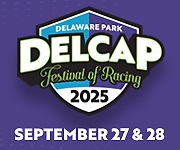Culminating a long and tumultuous process, Jeffrey Jacobs, owner of Colonial Downs, today surrendered Colonial’s “unlimited parimutuel owners and operators license,” effective November 1.
The move, before the Virginia Racing Commission, which voted unanimously to accept it, may effectively end the Jacobs era at Colonial Downs and cast the future of the New Kent County, VA track into question.
In a release, Jacobs said that he was making the move “rather than putting our industry through a painful public meeting which will benefit no one, and will just serve to polarize all the Virginia stakeholders.”
In truth, however, it is hard to see how the stakeholders could become more polarized than they already are.
Jacobs and the Virginia Horsemen’s Benevolent and Protective Association (VHBPA), which represents the Commonwealth’s horsemen, have been at each other’s throats since late 2013 over the future of Virginia racing.
Jacobs has repeatedly outlined a future increasingly focused on a small number of big days — three of them in his latest proposal, culminating with the Virginia Derby — and moves to cut Colonial’s costs for the remainder of the meet. Foremost among those is eliminating free stabling on the Colonial backside, which would make the track perhaps the only Thoroughbred track in the nation to do so. His latest effort would also have led to Colonial’s continued ability to accept wagering on Thoroughbred racing even without an operating contract with horsemen.
Horsemen have countered with proposals substantially similar to prior Colonial meets. Their most recent would have led to 24 days of racing at Colonial over eight weeks and the continuation of free stabling.
“I would like to see quality thoroughbred racing thrive and Colonial Downs move towards its full potential,” Jacobs said. “This is why I put forward this horsemen’s contract. After 17 years, we cannot continue on any other basis. Virginians deserve nothing less. The Virginia HBPA does not share our vision.”
That move predictably caused outrage among many horsemen, who contend that the ODTHA is essentially a sham organization created only to serve as “yes-men” to Colonial Downs.
And it would have put the state’s Racing Commission in the uncomfortable position of choosing between the state’s established horsemen’s group, the VHBPA, which has represented horsemen for more than a decade but has been unable to forge accord with the track owner this year; and an upstart group representing essentially no one but with a signed agreement with the track operator.
In the end, Jacobs’ withdrawal of his requests, which he said was predicated on “private conversations” that he said indicated the Commission would not back his effort, spared the Commission that choice.
“[T]he glory days have faded into memory,” Jacobs said. “I am very proud of all of the Colonial Downs’ associates and proud of what they have accomplished,” Jacobs said. “I am sorry that we have come to this day. Virginia horseracing must change and the change must be dramatic, with all the disruption that dramatic change brings.”








So, Jacobs surrenders his racing license, but says he has no plans to sell the track. My first thought was, at least it’s a great location for condos! What can be learned from today’s decision to close the track. First, what is the real purpose of having a Racing Commission if the regulatory body is essentially powerless and has no authority? Furthermore, with a legislature that is currently living in the 19th century, gaming and slots will never be in Virginia’s future! At least Jacobs was right about one thing…VA horse racing can not exist in its current condition.
Congrats to the VRC, the Jacobs Group and the VHBPA because 75 jobs, 350 seasonal jobs and $2 million in state and local taxes are now lost! Way to go guys! Jacobs can now go back to casino gambling, Frank and his band of claiming horsemen can now offer pony rides at local state fairs, and the VRC can go back to what they have always done…what is that anyway? As for the future, efforts will be made to try and revive racing in Virginia through the General Assembly and the Governor’s office. Good Luck with that!
Amen
You don’t sound like much of a fan to me…
The spread of casino gambling has been perhaps the single most important cause in the decline of public interest in horse racing. People who used to be horse fans and who would go to the track to take in a card are now slot zombies.
Totally agree, and those who go to the track to only look at the simulcasts are not much better. I often wonder if the TV zombies even realize there are live horses right outside the door…
Respectfully, you both completely miss the message with your posts.
The message is simple- the “slot zombies” gravitate toward what they perceive to be a better product. “TV zombies” do the same.
This is gambling. Few care if there are horses outside. They care about the menu of gambling options available to them.
That’s enough of that sh*t track!